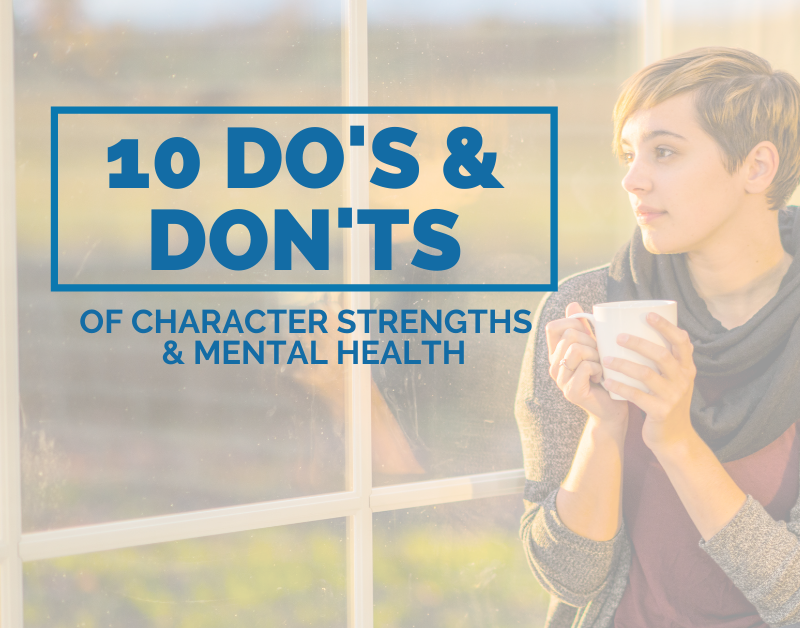As a psychologist, I know how important it is to take care of not just physical health but also psychological and social health. Whether you are pursuing your personal mental health or working to help others with theirs, it is vital to consider scientific findings. Science does not hold all the answers but it can be a guiding force for safety and benefit in the pursuit of the most wise decision possible.
Positive psychology has often been referred to as involving a focus of moving from what’s wrong to what’s strong – to shift our focus to discovering positive emotions, elevating our character strengths, and savoring what is good in our lives. That is partially true. Positive psychology is also about using what’s strong to deal with what’s wrong. Our character strengths are critical in building resilience, handling problems, and buffering future struggles from happening.
In this post, I focus on some of the Do’s and Don’ts of how our character strengths can help us tap into psychological well-being and optimally manage struggles.
DO: Review the list of 24 character strengths and consider which are most important for your mental health.
This offers a lens, special to you. When you examine the list of 24 strengths in the VIA Classification through the lens of your mental health, who knows what you’ll discover? Perhaps being humble is important for your mental health because it helps you stay grounded and connected with others. Maybe having a more disciplined and organized routine (e.g., the strength of self-regulation) is best for your mind feeling good and competent? Or, it might be that your relationships are tied to your mental health, especially mutual, healthy relationships; therefore, your mental health strengths might be social intelligence, teamwork, forgiveness, and kindness.
DO: Make character strengths part of an annual mental health checkup.
If you don’t have an annual mental health checkup – just like you probably do for your physical health – then make Mental Health Day your checkup each year!
While speaking with a mental health professional face-to-face is usually the ideal, it does not work for everyone. Mental Health America has a variety of screening tools that can be helpful in detecting more serious problems. In conjunction with these, you can take or retake the VIA survey so that your character strengths are kept at the top of your mind when considering mental health issues.
Research studies are finding that character strengths play a strong and versatile role in mental health.
DO: Ask your counselor or mental health professional to include character strengths in your treatment plan and in your discussions.
The assessment, discussion, and planning around character strengths can be woven into any treatment plan. If you receive mental health services, be an advocate for yourself! Let them know that they can check out the highly resourced VIA Institute website and to take the VIA Survey themselves. They can also turn to practitioner-focused books on character strengths such as Character Strengths Interventions.
DO: Remember that all 24 character strengths are already present in your mind.
Character strengths are capacities in you for thinking, feeling, and behaving – the trifecta of psychology. Just as anxiety and depression have a myriad of thoughts, emotions, and actions associated with them (for you and others), so do your character strengths. You can grow your character strengths thoughts, your character strengths feelings, and your character strengths actions. What does your prudence feel like? What is going on in your thinking when you are curious? When you consider your strengths as expressions of thought and emotion, you are experiencing your strengths more fully.
DO: Bring your character strengths to ANY goal you are pursuing.
Whether you are pursuing a personal or professional goal, remember that your character strengths can serve as pathways to that goal. Trying to stick with a new medicine? Use your prudence to make a plan and perseverance to overcome the obstacles along the way. Wanting to exercise more for your depression? Use your creativity to create a plan that you’ll stick with, and turn to your zest to be more enthusiastic when you do.
DON’T: Listen to only one voice in your mind/thinking.
The judging voice in your head can be loud and mean. Frequent and intense. Crafty and subtle. Often without your awareness, you can suddenly discover you’re in the midst of a self-critical downpour. “I really screwed that up. I’m no good. Why do I fail at everything?” Some self-criticism can be motivating. Too much can be deflating. But, what is missing here? Where are your character strengths voices?
When your kind voice is describing you, what does it say? How might your social intelligence voice respond when your judging voice gets loud? What would your fair or forgiving voice say after you make a mistake? When you find ways to expand your “character strength voices,” you are not only making use of a concept called polyvocality, you are expanding the way you relate to yourself.
You probably give a lot of energy to your judging voice. Is it time to give energy and attention to your strength voices?
DON’T: Over-interpret any finding in the field of psychology, no matter how promising, positive, substantive, or strong the research may be.
When you see a new headline about strengths or positivity, take a “cautiously optimistic approach.” Remember that research studies are usually conducted on groups of people. Even the best studies (randomized-controlled intervention trials) do not reveal 100% effectiveness for all people. Each person is unique and no activity or positive intervention will work for everyone. For example, one of the most effective interventions in positive psychology involves using one of your signature strengths (your highest character strengths) in a new way each day. While this has been shown in multiple scientific studies to bring benefits to happiness and depression, it should not be used as the only approach to improving mental health.
DON’T: Focus on your weaknesses at the expense of your strengths.
As humans, we have a bias toward what is negative, wrong, or a deficit within us. It is easy to become preoccupied with such problems, especially if we struggle with psychological disorders such as depression and anxiety. It is OK to try to correct your weaknesses, but this should not be done in a way that excludes your strengths. If you are going to work on a personal weakness, be sure to look at your strengths as well. Some research by Roy Baumeister, one of the most cited psychology researchers of all time, has suggested we target 4 good things for every 1 bad thing. This is not a “law of nature” but a research-based guideline. Therefore, if you are focusing on one of your deficits, also focus on at least four of your signature strengths!
DON’T: Allow character strengths to be the only tool you use to take care of your mental well-being.
There are many supportive strategies shown to offer mental health benefits. A few of these include mindfulness, yoga, pleasurable self-care, the pursuit of meaning in life, spiritual practices, building supportive relationships, eating healthy, sleeping well, exercising, seeing a psychotherapist/counselor, and engaging in good goal-setting practices, to name a few. Character strengths are one important piece of the puzzle.
DON’T: Lose hope.
You might feel hopeless and helpless, lost and confused, disconnected and frazzled. Suffering can be brutal – for you and those who care about you. At such times, it’s important to remember – and at least believe – that you have a character strength called “hope” within you. It might not feel strong or particularly present, but it is there. At such times, you might remember (or memorize) the words of the great poet Emily Dickinson who observed: Hope is the thing with feathers, That perches in the soul, And sings the tune without the words, And never stops at all.


